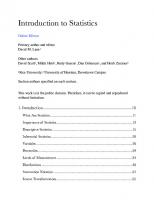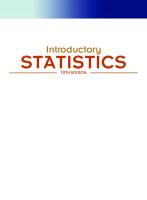Statistics [Thirteenth edition] 9780134080215, 1292161558, 9781292161556, 0134080211
A Contemporary ClassicClassic, yet contemporary; theoretical, yet applied--McClave & Sincich'sStatisticsgives y
391 23 51MB
English Pages 896 [900] Year 2017
Table of contents :
Front Cover......Page 1
Applet Correlation......Page 2
Title Page......Page 7
Copyright Page......Page 8
Contents......Page 9
Preface......Page 15
Applications Index......Page 23
Chapter 1 Statistics, Data, and Statistical Thinking......Page 31
Statistics in Action: Social Media Network Usage—Are You Linked In?......Page 32
1.2 Types of Statistical Applications......Page 33
1.3 Fundamental Elements of Statistics......Page 35
1.4 Types of Data......Page 39
1.5 Collecting Data: Sampling and Related Issues......Page 41
1.6 The Role of Statistics in Critical Thinking and Ethics......Page 46
Using Technology: MINITAB: Accessing and Listing Data......Page 55
Chapter 2 Methods for Describing Sets of Data......Page 59
2.1 Describing Qualitative Data......Page 61
2.2 Graphical Methods for Describing Quantitative Data......Page 72
2.3 Numerical Measures of Central Tendency......Page 84
2.4 Numerical Measures of Variability......Page 95
2.5 Using the Mean and Standard Deviation to Describe Data......Page 101
2.6 Numerical Measures of Relative Standing......Page 109
2.7 Methods for Detecting Outliers: Box Plots and z-Scores......Page 113
2.8 Graphing Bivariate Relationships (Optional)......Page 123
2.9 Distorting the Truth with Descriptive Statistics......Page 128
Statistics in Action: Body Image Dissatisfaction: Real or Imagined?......Page 60
TI-83/TI–84 Plus Graphing Calculator: Describing Data......Page 144
Chapter 3 Probability......Page 147
3.1 Events, Sample Spaces, and Probability......Page 149
3.2 Unions and Intersections......Page 162
3.3 Complementary Events......Page 165
3.4 The Additive Rule and Mutually Exclusive Events......Page 167
3.5 Conditional Probability......Page 174
3.6 The Multiplicative Rule and Independent Events......Page 177
3.7 Some Additional Counting Rules (Optional)......Page 189
Bayes’s Rule (Optional)......Page 199
Statistics in Action: Lotto Buster! Can You Improve Your Chance of Winning?......Page 148
Using Technology: TI-83/TI-84 Plus Graphing Calculator: Combinations and Permutations......Page 213
Chapter 4 Discrete Random Variables......Page 214
4.1 Two Types of Random Variables......Page 216
4.2 Probability Distributions for Discrete Random Variables......Page 219
4.3 Expected Values of Discrete Random Variables......Page 226
4.4 The Binomial Random Variable......Page 231
4.5 The Poisson Random Variable (Optional)......Page 244
4.6 The Hypergeometric Random Variable (Optional)......Page 249
Statistics in Action: Probability in a Reverse Cocaine Sting: Was Cocaine Really Sold?......Page 215
TI-83/TI-84 Plus Graphing Calculator: Discrete Random Variables and Probabilities......Page 259
Chapter 5 Continuous Random Variables......Page 262
5.1 Continuous Probability Distributions......Page 264
5.2 The Uniform Distribution......Page 265
5.3 The Normal Distribution......Page 269
5.4 Descriptive Methods for Assessing Normality......Page 283
5.5 Approximating a Binomial Distribution with a Normal Distribution (Optional)......Page 292
5.6 The Exponential Distribution (Optional)......Page 297
Statistics in Action: Super Weapons Development—Is the Hit Ratio Optimized?......Page 263
Using Technology: MINITAB: Continuous Random Variable Probabilities and Normal Probability Plots......Page 309
TI–83/TI–84 Plus Graphing Calculator: Normal Random Variable and Normal Probability Plots......Page 310
Chapter 6 Sampling Distributions......Page 312
6.1 The Concept of a Sampling Distribution......Page 314
6.2 Properties of Sampling Distributions: Unbiasedness and Minimum Variance......Page 321
6.3 The Sampling Distribution of x and the Central Limit Theorem......Page 325
6.4 The Sampling Distribution of the Sample Proportion......Page 334
Statistics in Action: The Insomnia Pill: Is It Effective?......Page 313
Using Technology: MINITAB: Simulating a Sampling Distribution......Page 343
Chapter 7 Inferences Based on a Single Sample: Estimation with Confidence Intervals......Page 344
Statistics in Action: Medicare Fraud Investigations......Page 345
7.2 Confidence Interval for a Population Mean: Normal (z) Statistic......Page 347
7.3 Confidence Interval for a Population Mean: Student’s t-Statistic......Page 357
7.4 Large-Sample Confidence Interval for a Population Proportion......Page 367
7.5 Determining the Sample Size......Page 374
7.6 Confidence Interval for a Population Variance (Optional)......Page 381
Using Technology: MINITAB: Confidence Intervals......Page 394
TI-83/TI-84 Plus Graphing Calculator: Confidence Intervals......Page 396
Chapter 8 Inferences Based on a Single Sample: Tests of Hypothesis......Page 398
Statistics in Action: Diary of a KLEENEX® User—How Many Tissues in a Box?......Page 399
8.2 Formulating Hypotheses and Setting Up the Rejection Region......Page 405
8.3 Observed Significance Levels:p-Values......Page 410
8.4 Test of Hypothesis about a Population Mean: Normal (z) Statistic......Page 415
8.5 Test of Hypothesis about a Population Mean: Student’s t-Statistic......Page 423
8.6 Large-Sample Test of Hypothesis about a Population Proportion......Page 430
8.7 Calculating Type II Error Probabilities: More about β (Optional)......Page 438
8.8 Test of Hypothesis about a Population Variance (Optional)......Page 447
Using Technology: MINITAB: Tests of Hypotheses......Page 460
TI-83/TI-84 Plus Graphing Calculator: Tests of Hypotheses......Page 461
Chapter 9 Inferences Based on Two Samples: Confidence Intervals and Tests of Hypotheses......Page 463
Statistics in Action: ZixIt Corp. v. Visa USA Inc.—A Libel Case......Page 464
9.2 Comparing Two Population Means: Independent Sampling......Page 465
9.3 Comparing Two Population Means: Paired Difference Experiments......Page 483
9.4 Comparing Two Population Proportions: Independent Sampling......Page 495
9.5 Determining the Sample Size......Page 503
9.6 Comparing Two Population Variances: Independent Sampling (Optional)......Page 508
Using Technology: MINITAB: Two-Sample Inferences......Page 527
TI-83/TI-84 Plus Graphing Calculator: Two Sample Inferences......Page 528
Chapter 10 Analysis of Variance: Comparing More than Two Means......Page 532
10.1 Elements of a Designed Study......Page 534
10.2 The Completely Randomized Design: Single Factor......Page 541
10.3 Multiple Comparisons of Means......Page 558
10.4 The Randomized Block Design......Page 566
10.5 Factorial Experiments: Two Factors......Page 584
Statistics in Action: Voice versus Face Recognition—Does One Follow the Other?......Page 533
Using Technology: MINITAB: Analysis of Variance......Page 612
TI–83/TI–84 Plus Graphing Calculator: Analysis of Variance......Page 613
Chapter 11 Simple Linear Regression......Page 614
11.1 Probabilistic Models......Page 616
11.2 Fitting the Model: The Least Squares Approach......Page 620
11.3 Model Assumptions......Page 633
11.4 Assessing the Utility of the Model: Making Inferences about the Slope β1......Page 638
11.5 The Coefficients of Correlation and Determination......Page 647
11.6 Using the Model for Estimation and Prediction......Page 657
11.7 A Complete Example......Page 666
Statistics in Action: Can “Dowsers” Really Detect Water?......Page 615
Using Technology: MINITAB: Simple Linear Regression......Page 680
TI-83/TI-84 Plus Graphing Calculator: Simple Linear Regression......Page 681
Chapter 12 Multiple Regression and Model Building......Page 683
12.1 Multiple-Regression Models......Page 685
12.2 Estimating and Making Inferences about the β Parameters......Page 687
12.3 Evaluating Overall Model Utility......Page 694
12.4 Using the Model for Estimation and Prediction......Page 705
12.5 Interaction Models......Page 711
12.6 Quadratic and Other Higher Order Models......Page 718
12.7 Qualitative (Dummy) Variable Models......Page 728
12.8 Models with Both Quantitative and Qualitative Variables (Optional)......Page 736
12.9 Comparing Nested Models (Optional)......Page 746
12.10 Stepwise Regression (Optional)......Page 756
12.11 Residual Analysis: Checking the Regression Assumptions......Page 762
12.12 Some Pitfalls: Estimability, Multicollinearity, and Extrapolation......Page 776
Statistics in Action: Modeling Condominium Sales: What Factors Affect Auction Price?......Page 684
Using Technology: MINITAB: Multiple Regression......Page 798
TI-83/TI-84 Plus Graphing Calculator: Multiple Regression......Page 799
Chapter 13 Categorical Data Analysis......Page 801
13.1 Categorical Data and the Multinomial Experiment......Page 803
13.2 Testing Categorical Probabilities: One-Way Table......Page 804
13.3 Testing Categorical Probabilities: Two-Way (Contingency) Table......Page 812
13.4 A Word of Caution about Chi-Square Tests......Page 827
Statistics in Action: The Case of the Ghoulish Transplant Tissue......Page 802
Using Technology: MINITAB: Chi-Square Analyses......Page 837
TI-83/TI-84 Plus Graphing Calculator: Chi-Square Analyses......Page 838
Appendix A: Summation Notation......Page 839
Table XIII Critical Values of the Studentized Range, α = .01......Page 841
Appendix C: Calculation Formulas for Analysis of Variance......Page 863
Short Answers to Selected Odd-Numbered Exercises......Page 868
Index......Page 880
Credits......Page 886
Making Connections Using Data......Page 898
Back Cover......Page 900
Front Cover......Page 1
Applet Correlation......Page 2
Title Page......Page 7
Copyright Page......Page 8
Contents......Page 9
Preface......Page 15
Applications Index......Page 23
Chapter 1 Statistics, Data, and Statistical Thinking......Page 31
Statistics in Action: Social Media Network Usage—Are You Linked In?......Page 32
1.2 Types of Statistical Applications......Page 33
1.3 Fundamental Elements of Statistics......Page 35
1.4 Types of Data......Page 39
1.5 Collecting Data: Sampling and Related Issues......Page 41
1.6 The Role of Statistics in Critical Thinking and Ethics......Page 46
Using Technology: MINITAB: Accessing and Listing Data......Page 55
Chapter 2 Methods for Describing Sets of Data......Page 59
2.1 Describing Qualitative Data......Page 61
2.2 Graphical Methods for Describing Quantitative Data......Page 72
2.3 Numerical Measures of Central Tendency......Page 84
2.4 Numerical Measures of Variability......Page 95
2.5 Using the Mean and Standard Deviation to Describe Data......Page 101
2.6 Numerical Measures of Relative Standing......Page 109
2.7 Methods for Detecting Outliers: Box Plots and z-Scores......Page 113
2.8 Graphing Bivariate Relationships (Optional)......Page 123
2.9 Distorting the Truth with Descriptive Statistics......Page 128
Statistics in Action: Body Image Dissatisfaction: Real or Imagined?......Page 60
TI-83/TI–84 Plus Graphing Calculator: Describing Data......Page 144
Chapter 3 Probability......Page 147
3.1 Events, Sample Spaces, and Probability......Page 149
3.2 Unions and Intersections......Page 162
3.3 Complementary Events......Page 165
3.4 The Additive Rule and Mutually Exclusive Events......Page 167
3.5 Conditional Probability......Page 174
3.6 The Multiplicative Rule and Independent Events......Page 177
3.7 Some Additional Counting Rules (Optional)......Page 189
Bayes’s Rule (Optional)......Page 199
Statistics in Action: Lotto Buster! Can You Improve Your Chance of Winning?......Page 148
Using Technology: TI-83/TI-84 Plus Graphing Calculator: Combinations and Permutations......Page 213
Chapter 4 Discrete Random Variables......Page 214
4.1 Two Types of Random Variables......Page 216
4.2 Probability Distributions for Discrete Random Variables......Page 219
4.3 Expected Values of Discrete Random Variables......Page 226
4.4 The Binomial Random Variable......Page 231
4.5 The Poisson Random Variable (Optional)......Page 244
4.6 The Hypergeometric Random Variable (Optional)......Page 249
Statistics in Action: Probability in a Reverse Cocaine Sting: Was Cocaine Really Sold?......Page 215
TI-83/TI-84 Plus Graphing Calculator: Discrete Random Variables and Probabilities......Page 259
Chapter 5 Continuous Random Variables......Page 262
5.1 Continuous Probability Distributions......Page 264
5.2 The Uniform Distribution......Page 265
5.3 The Normal Distribution......Page 269
5.4 Descriptive Methods for Assessing Normality......Page 283
5.5 Approximating a Binomial Distribution with a Normal Distribution (Optional)......Page 292
5.6 The Exponential Distribution (Optional)......Page 297
Statistics in Action: Super Weapons Development—Is the Hit Ratio Optimized?......Page 263
Using Technology: MINITAB: Continuous Random Variable Probabilities and Normal Probability Plots......Page 309
TI–83/TI–84 Plus Graphing Calculator: Normal Random Variable and Normal Probability Plots......Page 310
Chapter 6 Sampling Distributions......Page 312
6.1 The Concept of a Sampling Distribution......Page 314
6.2 Properties of Sampling Distributions: Unbiasedness and Minimum Variance......Page 321
6.3 The Sampling Distribution of x and the Central Limit Theorem......Page 325
6.4 The Sampling Distribution of the Sample Proportion......Page 334
Statistics in Action: The Insomnia Pill: Is It Effective?......Page 313
Using Technology: MINITAB: Simulating a Sampling Distribution......Page 343
Chapter 7 Inferences Based on a Single Sample: Estimation with Confidence Intervals......Page 344
Statistics in Action: Medicare Fraud Investigations......Page 345
7.2 Confidence Interval for a Population Mean: Normal (z) Statistic......Page 347
7.3 Confidence Interval for a Population Mean: Student’s t-Statistic......Page 357
7.4 Large-Sample Confidence Interval for a Population Proportion......Page 367
7.5 Determining the Sample Size......Page 374
7.6 Confidence Interval for a Population Variance (Optional)......Page 381
Using Technology: MINITAB: Confidence Intervals......Page 394
TI-83/TI-84 Plus Graphing Calculator: Confidence Intervals......Page 396
Chapter 8 Inferences Based on a Single Sample: Tests of Hypothesis......Page 398
Statistics in Action: Diary of a KLEENEX® User—How Many Tissues in a Box?......Page 399
8.2 Formulating Hypotheses and Setting Up the Rejection Region......Page 405
8.3 Observed Significance Levels:p-Values......Page 410
8.4 Test of Hypothesis about a Population Mean: Normal (z) Statistic......Page 415
8.5 Test of Hypothesis about a Population Mean: Student’s t-Statistic......Page 423
8.6 Large-Sample Test of Hypothesis about a Population Proportion......Page 430
8.7 Calculating Type II Error Probabilities: More about β (Optional)......Page 438
8.8 Test of Hypothesis about a Population Variance (Optional)......Page 447
Using Technology: MINITAB: Tests of Hypotheses......Page 460
TI-83/TI-84 Plus Graphing Calculator: Tests of Hypotheses......Page 461
Chapter 9 Inferences Based on Two Samples: Confidence Intervals and Tests of Hypotheses......Page 463
Statistics in Action: ZixIt Corp. v. Visa USA Inc.—A Libel Case......Page 464
9.2 Comparing Two Population Means: Independent Sampling......Page 465
9.3 Comparing Two Population Means: Paired Difference Experiments......Page 483
9.4 Comparing Two Population Proportions: Independent Sampling......Page 495
9.5 Determining the Sample Size......Page 503
9.6 Comparing Two Population Variances: Independent Sampling (Optional)......Page 508
Using Technology: MINITAB: Two-Sample Inferences......Page 527
TI-83/TI-84 Plus Graphing Calculator: Two Sample Inferences......Page 528
Chapter 10 Analysis of Variance: Comparing More than Two Means......Page 532
10.1 Elements of a Designed Study......Page 534
10.2 The Completely Randomized Design: Single Factor......Page 541
10.3 Multiple Comparisons of Means......Page 558
10.4 The Randomized Block Design......Page 566
10.5 Factorial Experiments: Two Factors......Page 584
Statistics in Action: Voice versus Face Recognition—Does One Follow the Other?......Page 533
Using Technology: MINITAB: Analysis of Variance......Page 612
TI–83/TI–84 Plus Graphing Calculator: Analysis of Variance......Page 613
Chapter 11 Simple Linear Regression......Page 614
11.1 Probabilistic Models......Page 616
11.2 Fitting the Model: The Least Squares Approach......Page 620
11.3 Model Assumptions......Page 633
11.4 Assessing the Utility of the Model: Making Inferences about the Slope β1......Page 638
11.5 The Coefficients of Correlation and Determination......Page 647
11.6 Using the Model for Estimation and Prediction......Page 657
11.7 A Complete Example......Page 666
Statistics in Action: Can “Dowsers” Really Detect Water?......Page 615
Using Technology: MINITAB: Simple Linear Regression......Page 680
TI-83/TI-84 Plus Graphing Calculator: Simple Linear Regression......Page 681
Chapter 12 Multiple Regression and Model Building......Page 683
12.1 Multiple-Regression Models......Page 685
12.2 Estimating and Making Inferences about the β Parameters......Page 687
12.3 Evaluating Overall Model Utility......Page 694
12.4 Using the Model for Estimation and Prediction......Page 705
12.5 Interaction Models......Page 711
12.6 Quadratic and Other Higher Order Models......Page 718
12.7 Qualitative (Dummy) Variable Models......Page 728
12.8 Models with Both Quantitative and Qualitative Variables (Optional)......Page 736
12.9 Comparing Nested Models (Optional)......Page 746
12.10 Stepwise Regression (Optional)......Page 756
12.11 Residual Analysis: Checking the Regression Assumptions......Page 762
12.12 Some Pitfalls: Estimability, Multicollinearity, and Extrapolation......Page 776
Statistics in Action: Modeling Condominium Sales: What Factors Affect Auction Price?......Page 684
Using Technology: MINITAB: Multiple Regression......Page 798
TI-83/TI-84 Plus Graphing Calculator: Multiple Regression......Page 799
Chapter 13 Categorical Data Analysis......Page 801
13.1 Categorical Data and the Multinomial Experiment......Page 803
13.2 Testing Categorical Probabilities: One-Way Table......Page 804
13.3 Testing Categorical Probabilities: Two-Way (Contingency) Table......Page 812
13.4 A Word of Caution about Chi-Square Tests......Page 827
Statistics in Action: The Case of the Ghoulish Transplant Tissue......Page 802
Using Technology: MINITAB: Chi-Square Analyses......Page 837
TI-83/TI-84 Plus Graphing Calculator: Chi-Square Analyses......Page 838
Appendix A: Summation Notation......Page 839
Table XIII Critical Values of the Studentized Range, α = .01......Page 841
Appendix C: Calculation Formulas for Analysis of Variance......Page 863
Short Answers to Selected Odd-Numbered Exercises......Page 868
Index......Page 880
Credits......Page 886
Making Connections Using Data......Page 898
Back Cover......Page 900
![Statistics [Thirteenth edition]
9780134080215, 1292161558, 9781292161556, 0134080211](https://ebin.pub/img/200x200/statistics-thirteenth-edition-9780134080215-1292161558-9781292161556-0134080211.jpg)
- Author / Uploaded
- McClave
- James T;Sincich
- Terry T
![Statistics [Thirteenth edition global edition]
9780134080215, 1292161558, 9781292161556, 0134080211](https://ebin.pub/img/200x200/statistics-thirteenth-edition-global-edition-9780134080215-1292161558-9781292161556-0134080211.jpg)
![Uniform evidence law [Thirteenth edition.]
9780455501024, 0455501025](https://ebin.pub/img/200x200/uniform-evidence-law-thirteenth-edition-9780455501024-0455501025.jpg)
![Educational psychology [Thirteenth edition]
9781292095301, 129209530X](https://ebin.pub/img/200x200/educational-psychology-thirteenth-edition-9781292095301-129209530x.jpg)


![Modern control systems [Thirteenth edition]
9780134407623, 1292152974, 9781292152974, 0134407628](https://ebin.pub/img/200x200/modern-control-systems-thirteenth-edition-9780134407623-1292152974-9781292152974-0134407628.jpg)

![Introductory circuit analysis [Thirteenth edition]
9780133923605, 1292098953, 9781292098951, 0133923606](https://ebin.pub/img/200x200/introductory-circuit-analysis-thirteenth-edition-9780133923605-1292098953-9781292098951-0133923606.jpg)

![The developing child [Thirteenth edition (New Int. ed.)]
1292020806, 9781292020808](https://ebin.pub/img/200x200/the-developing-child-thirteenth-edition-new-int-ed-1292020806-9781292020808.jpg)